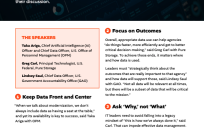 My journey as a management and program analyst in the Justice Department (DOJ) started about two years ago. Before finding my dream position, I had to dig deep and think about what career closely mirrored my past experiences.
My journey as a management and program analyst in the Justice Department (DOJ) started about two years ago. Before finding my dream position, I had to dig deep and think about what career closely mirrored my past experiences.
For instance, I had plenty of experiences working in collaborative settings. Also, I had already served as the liaison between two entities to help improve the academic, financial or legal settings at the organizations I worked in. Most of my internship experiences dealt with administrative work where I corresponded with clients, processed important documentation, used specialized computer programs and wrote official reports describing the data I examined on a daily basis. Lastly, I pursued a master’s degree which helped me develop the analytical and statistical knowledge needed in order to produce comprehensive results that could influence long-term management or financial decisions within a company.
During my search, I came across two positions – management analysts and program analysts – that I felt would be perfect fits. However, I noticed these positions slightly differed in their responsibilities, so it was difficult to determine which position would be a better fit. In the end, I was able to find a career that fell in the middle and combined both positions into one.
If you are currently looking for a job where you can combine your love for public service and writing, you are detail-oriented and interested in examining data, then a career as a management analyst or program analyst may be for you too.
Management Analysts and Program Analysts: Their Role
Today, companies use technology to compute large amounts of data in the blink of an eye. This evolution has saved people a lot of time over the decades. However, the data is still not useful until it is analyzed and applied in the real world. This is where management and program analysts become essential. It is their duty to give the data meaning by analyzing it and making informed decisions on how they should conduct current and future transactions.
This is obtained by converting the large magnitude of data into the computer base and using specialized systems to examine if any substantial patterns are found. The conclusions would confirm if these trends could potentially harm or help the company’s ability to perform its daily tasks. Based on the findings, an analyst would be able to give insight to senior staff or develop a practical plan in order to improve the job’s capability to function. Overall, both management and program analysts are responsible for improving an organization’s efficiency in achieving its goals.
The federal government has combined the two roles into one, creating the Management and Program Analysts series (GS-0343). The positions categorized under this title were created to ensure that governmental programs, operations and the agency itself function properly. Typically found in the administrative sector, these analysts are responsible for a variety of assignments that would have been handled separately by program and management analysts at other corporations. This opportunity allows their employees to become well rounded and gain expertise in numerous areas needed to maintain the efficient productivity of a company.
Their Focus
All of the analysts share similar functions within their roles. However, they are achieved by using different methods. Below are the unique distinctions between each position.
Management Analysts
Professionals who explore this career are expected to evaluate and find techniques to consistently improve an organization’s ability to operate as a whole.
To illustrate, management analysts can be compared to the heart of the company. They are needed to keep all operations pumping smoothly around the clock. These analysts collaborate with other departments within the corporation to ensure all its budgets, payrolls, policies and programs are accurate at all times. It is also a part of their duty to analyze the company’s progress and see areas they can improve. Lastly, they anticipate any future financial needs by analyzing past data that has been collected over time. It is common for analysts to consult their findings and solutions through writing an official report or creating charts to present to senior management. Without these analysts, most agencies would not be able to stay afloat.
Policy Analyst
A policy analyst’s job is a bit more specialized. They help maintain a company’s efficiency by analyzing and improving its technical systems.
Those in this position are knowledgeable of the organization’s internal databases. They inspect these areas regularly to note their progression and create ways to improve its technical efficiency for the company’s benefit.
Similar to management analysts, they write about the conclusions and recommendations made based on the collected data, which is then reviewed by senior management for approval. In other words, policy analysts influence the way companies operate by how they are able to process their daily operations. It is the analyst’s goal to find the most effective and cost-efficient method to do so. Essentially, policy analysts are needed because they make an organization more profitable.
Government Management and Program Analysts
Positions that fall under this series specifically focus on the operations that happen within the federal government. They primarily focus on how each agency and its individual components are able to utilize their systematic programs and function as a whole. They identify areas that need improvement.
These tasks are completed by a team of analysts who collaborate to provide the agency objective information on a variety of governmental matters. Financial management, assessing program development and amending policies/principles are just a few of the items that are regularly completed by management and program analysts in government.
Briana Richardson-Jones serves as a Justice Department (DOJ) program analyst. Before becoming a federal employee, she pursued a Bachelor of Arts in English and a Master’s of Science in criminology with a public policy concentration. She believes she can help prospective and new employees navigate government efficiently while currently doing the same. Briana has discovered creative tips that can help others “work smarter” in the future. She also plans on combining her love for writing and criminal justice to educate readers about current events and community issues affecting people worldwide.





Leave a Reply
You must be logged in to post a comment.